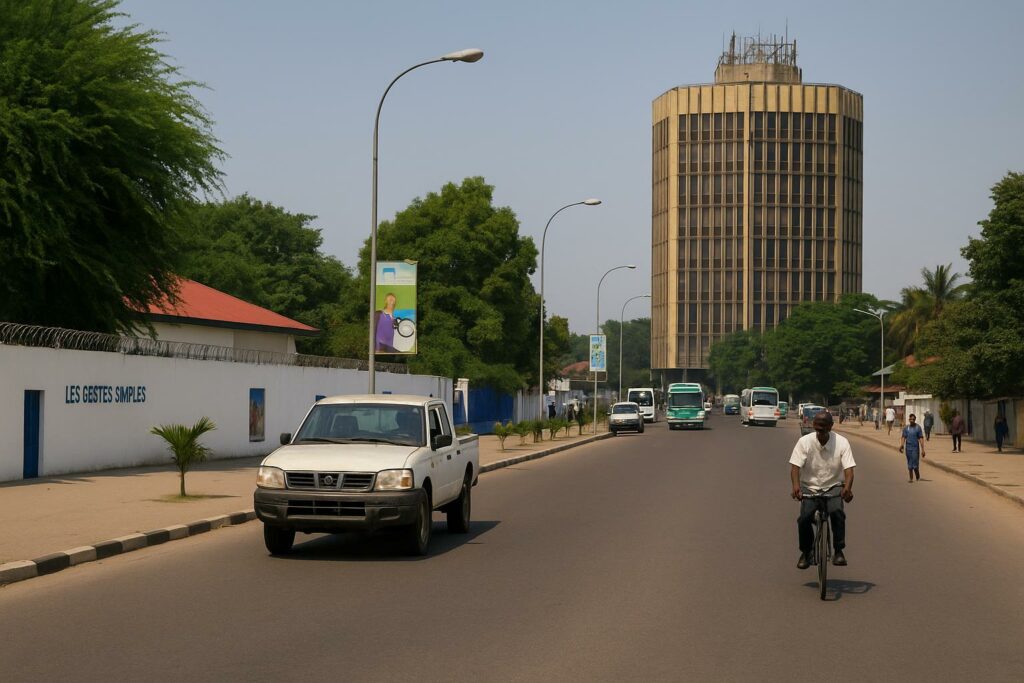Government tightens oversight on sensitive goods
Without prior fanfare, a ministerial circular dated 30 October 2025 reached customs posts and importers across the Republic of the Congo, instructing an immediate suspension, « until further notice », of all shipments of machetes and motorcycles. The wording leaves no exemption for engine capacity, blade length or private consignments, and positions the two commodities on a growing list of so-called sensitive goods subject to heightened scrutiny. In the accompanying note, the authorities highlight the need to “preserve public tranquillity through a proactive control of products liable to be misused for violent ends”. Such language situates the ban within the government’s wider doctrine of preventive security, rather than in the realm of trade protectionism.
Urban security imperative behind the decree
Since late September elite police units have multiplied patrols in Brazzaville and Pointe-Noire aiming to dismantle youth gangs popularly labelled “bébés noirs” or, in their Kinshasa variant, “Kulunas”. Investigators report that motorcycles grant these groups swift mobility through congested arteries, while machetes remain their weapon of predilection for intimidation and mutilation. By obstructing the logistical nexus—means of transport as well as armament—the executive hopes to fracture the operational capabilities of such networks before the festive season, historically a period of rising petty crime. A senior officer, declining to be identified, deems the embargo “a forceful but proportionate instrument that supports the ongoing pacification drive without deploying additional troops”.
In the streets: diverging public perceptions
On Avenue de la Paix in the capital’s third arrondissement, Sunday traffic flowed with unusual ease when Joël, a forty-something civil servant, emerged from a motorcycle dealership. “Prices have not climbed yet and, frankly, I welcome the decision. Too many delinquents hide behind motorbike taxi jackets,” he observed. His enthusiasm fades in districts where two-wheeled mobility is often the only link to schools, health centres or markets. “It will inconvenience us,” countered Nathanaël, an inhabitant of a densely populated suburb. “Some neighbourhoods are virtually landlocked; we depend on bikes to cross the city.” Their exchange illustrates how the same decree can embody reassurance for some and impending hardship for others.
Rural stakeholders voice caution
Beyond the capital, farming cooperatives fear collateral damage. An agronomist active in the Pool department recalled that the machete remains “the very first implement of any grower, as indispensable as the hoe”. While acknowledging the security rationale, he urged the authorities to sketch out a derogation mechanism for bona fide agricultural users. In a country where roughly one Congolese out of three derives income from smallholder agriculture, any enduring shortage of machetes could hamper land-clearing campaigns scheduled after the next rains and, by extension, food supply.
Le point juridique et économique
The presidential majority maintains that the suspension complies with both the 2018 Law on National Security and Congo’s obligations under the Central African Economic and Monetary Community, which allow temporary restrictions for reasons of public order. From a commercial vantage point, the move interrupts an import flow estimated at 35,000 motorcycles and close to 400,000 machetes per year, largely sourced from China and India. Economists interviewed consider the macroeconomic shock limited, yet retailers anticipate a gradual price uptick if inventories are depleted before the decree is lifted. Insurance underwriters, on the other hand, foresee lower claims related to motorcycle accidents and armed robberies, two of their costliest categories.
À retenir
The decree simultaneously targets mobility and weaponry, echoing recent successes of the anti-gang campaign. It is open-ended in time, signalling executive resolve but also inviting periodic assessment to mitigate unintended socio-economic ripple effects. Transparency around review benchmarks may prove decisive for public acceptance.
International perspective and reputational stakes
Neighbouring capitals observe Brazzaville’s experiment with interest. Kinshasa, where kuluna gangs have long challenged policing capacities, has sporadically floated similar restrictions without enacting them. Diplomatic sources consider Congo’s measure “cautiously innovative”, potentially offering a template for region-wide coordination against itinerant criminal groups that capitalise on porous borders. The initiative may also reinforce the country’s image among investors as a jurisdiction willing to act decisively to secure urban corridors and logistics nodes, a prerequisite for large-scale infrastructure projects envisioned under the National Development Plan 2022-2026.

